

NYC councilman Ritchie Torres takes on face recognition. It’s no secret that American law has been building facial recognition databases to aide in its investigations.
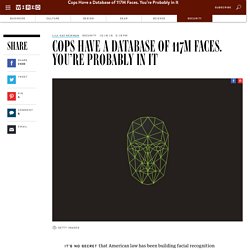
But a new, comprehensive report on the status of facial recognition as a tool in law enforcement shows the sheer scope and reach of the FBI’s database of faces and those of state-level law enforcement agencies: Roughly half of American adults are included in those collections. And that massive assembly of biometric data is accessed with only spotty oversight of its accuracy and how it’s used and searched. The 150-page report, released on Tuesday by the Center for Privacy & Technology at the Georgetown University law school, found that law enforcement databases now include the facial recognition information of 117 million Americans, about one in two U.S. adults. It goes on to outline the dangers to privacy, free speech, and protections against unreasonable search and seizure that come from unchecked use of that information. Rights groups request U.S. probe police use of facial recognition. FBI Facial Recognition Database Innocent People. If you have a driver's license, odds are better than even that your photo is sitting in a police database somewhere.
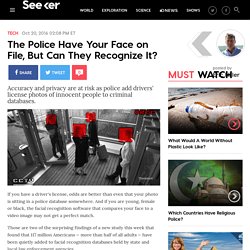
And if you are young, female or black, the facial recognition software that compares your face to a video image may not get a perfect match. Those are two of the surprising findings of a new study this week that found that 117 million Americans — more than half of all adults — have been quietly added to facial recognition databases held by state and local law enforcement agencies. All drivers in Maryland and Virginia, for example, have been added into a computer. So, too, have residents of San Francisco, Los Angeles and San Diego, Calif.
The New York Police Department may soon use these databases to match drivers' licenses to video from close-circuit TV cameras. Checking for identification markers such as fingerprints or DNA against a database of known criminals has been commonplace in police departments. RELATED: Face Recognition Method Works in Utter Darkness Sen. Half of US adults are recorded in police facial recognition databases, study says. Half of all American adults are included in databases police use to identify citizens with facial recognition technology, according to new research that raises serious concerns about privacy violations and the widespread use of racially biased surveillance technology.
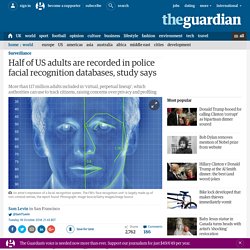
A report from Georgetown Law’s Center on Privacy and Technology found that more than 117 million adults are captured in a “virtual, perpetual lineup”, which means law enforcement offices across the US can scan their photos and use unregulated software to track law-abiding citizens in government datasets. Numerous major police departments have “real-time face recognition” technology that allows surveillance cameras to scan the faces of pedestrians walking down the street, the report found. In Maryland, police have been using software to identify faces in protest photos and match them to people with warrants, according to the American Civil Liberties Union (ACLU). Facial recognition database used by FBI is out of control, House committee he...
Approximately half of adult Americans’ photographs are stored in facial recognition databases that can be accessed by the FBI, without their knowledge or consent, in the hunt for suspected criminals.
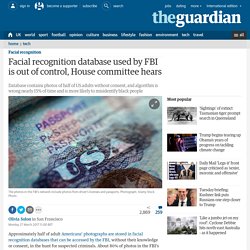
About 80% of photos in the FBI’s network are non-criminal entries, including pictures from driver’s licenses and passports. The algorithms used to identify matches are inaccurate about 15% of the time, and are more likely to misidentify black people than white people. These are just some of the damning facts presented at last week’s House oversight committee hearing, where politicians and privacy campaigners criticized the FBI and called for stricter regulation of facial recognition technology at a time when it is creeping into law enforcement and business. “But it can also be used by bad actors to harass or stalk individuals. “For those reasons and others, we must conduct proper oversight of this emerging technology,” he said. “This response is very troubling. The FBI has collected 430,000 iris scans in a so-called 'pilot program' To create that pool of scans, the FBI has struck information-sharing agreements with other agencies, including US Border Patrol, the Pentagon, and local law enforcement departments.
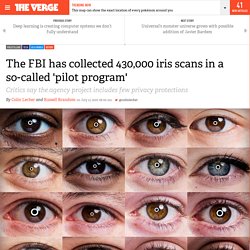
California has been most aggressive about collecting scans, but agencies in Texas and Missouri can also add to and search the system. The result amounts to a new national biometric database that stretches the traditional boundaries of a pilot program, while staying just outside the reach of privacy mandates often required for such data-gathering projects.
"The fact these systems have gone forward without any public debate or oversight that we've been able to find is very troubling," says Nicole Ozer, Technology and Civil Liberties Policy director at the ACLU of California, who likened the project to other programs, such as facial recognition and cell site simulators, that have also been put in place in the state. That changed in 2013, when the FBI launched an iris pilot program. Photo: Amelia Holowaty Krales.